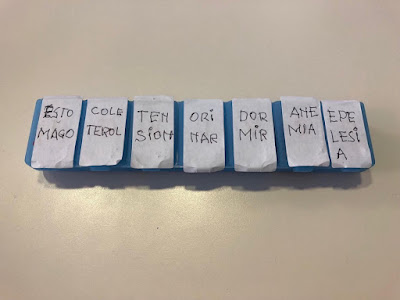Es desconcertante llegar a la conclusión de que no lo sabemos. Tenemos más números que nunca, nadamos en océanos de datos, contamos con poderosos ordenadores y algoritmos... pero sigue siendo imposible mirar la cara del futuro. Eso nos produce incertidumbre y desazón evitando que muchos puedan dormir bien y otros tantos caminen por la vida sumidos en agobio.
Todo esto no es nuevo, lo incierto es inherente al hecho de vivir por más que nos intenten convencer de que comprando productos o servicios seremos por fin dueños de tan ingrato personaje.
Frente al futuro no cabe más que bajar la cabeza y reconocer nuestra impotencia. Solo nos queda centrarnos en lo que tengamos entre manos en el momento presente y desde ahí caminar. Dónde lleguemos se verá, nos debería bastar con ir marcando una dirección, un estilo y una forma de viajar a cada paso dado.
Me llegan noticias del cuidado funeral de estado que tuvo lugar en el patio de armas del palacio real de Madrid. Acto en memoria de los que murieron de Covid19. Y me doy cuenta de que los seres humanos seguimos intentando hacer pactos y trampas de futuro. Por mucho que exorcicemos algo no nos libraremos de ello, y es de esperar un nuevo montón de fallecimientos en los próximos meses aunque a nadie nos guste reconocerlo. El futuro sigue siendo ingobernable.
Una cosa es tener la sensación de saber y otra muy distinta saber algo. Hoy estamos vestidos con las sofisticadas ropas de la tecnología que nos ayudan a sentirnos seguros dentro de un mundo en el que seguimos estando casi desnudos en cuanto a comprensión. Cualquiera que contemple en profundidad el estado de cosas llegará a la conclusión de nuestra profunda ignorancia. Seguimos sin saber.
Es cierto que las narrativas nos ayudan, a ellas nos amarramos cuando notamos que el oleaje de la vida zarandea la embarcación que nos transporta. Pero si no están asentadas en un reconocimiento del misterio que nos rodea y de la fragilidad que nos aporta nuestra gran ignorancia y levedad, seguiremos sumidos en el engaño del discurso oficial que nos otorga una carta de regia soberanía cuando seguimos siendo monos desnudos que caminan bajo el sol.
Cubrámonos con la delgada tela de la consciencia y vistamos la cabeza con el sombrero de paja del reconocimiento de nuestra finitud. Solo así evitaremos abrasarnos por el miedo y por la incertidumbre. Y dejaremos de seguir a tanto interesado que nos quiere llevar por la senda del acantilado, esa tan de moda que enriquece a unos pocos.
Not knowing.
It's disconcerting to conclude that we don't know. We have more numbers than ever, we swim in oceans of data, we have powerful computers and algorithms... but it's still impossible to look at the face of the future. This makes us uncertain and uneasy, preventing many from sleeping well and oblying many others to walk through life in a state of stress.
All this is not new, the uncertainty is inherent to the fact of living no matter how much they try to convince us that by buying products or services we will finally be owners of such an ungrateful character.
Faced with the future, we can only bow our heads and acknowledge our helplessness. All that remains is to focus on what we have in our hands at the present moment and walk from there. Where we arrive will be seen, it should be enough for us to mark out a direction, a style and a way to travel at each step taken.
I have received news of the state funeral that took place in the courtyard of the royal palace in Madrid. An act in memory of those who died of Covid19. And I realize that we human beings are still trying to make pacts and traps for the future. No matter how much we exorcise something we will not get rid of it, and we can expect a new pile of deaths in the coming months even if no one likes to acknowledge it. The future remains unmanageable.
It's one thing to have a sense of knowing, it's quite another to know something. Today we are dressed in the sophisticated clothes of technology that help us feel safe in a world where we are still almost naked in terms of understanding. Anyone who looks deeply into the state of things will come to the conclusion of our deep ignorance. We still do not know.
It is true that narratives help us; we tie ourselves to them when we notice the swell of life rocking the boat that transports us. But if they are not grounded in a recognition of the mystery that surrounds us and the fragility that our great ignorance and lightness brings us, we will continue to be submerged in the deception of the official discourse that grants us a charter of sovereignty when we continue to be naked monkeys that walk in the sun.
Let us cover ourselves with the thin fabric of consciousness and wear the straw hat of recognition of our finitude. Only in this way will we avoid being burned by fear and uncertainty. And we will stop following so many interested people who want to take us along the path of the cliff, that so fashionable one that enriches a few.
不知道。
自動翻譯,對錯誤感到抱歉。
得出結論,我們不知道令人不安。我們比以往任何時候都擁有更多的數字,我們在數據的海洋中暢遊,我們擁有強大的計算機和算法……但是,展望未來仍然是不可能的。這使我們變得不確定和不安,使許多人無法安然入睡,並迫使許多其他人處於壓力狀態下度過生活。
所有這些都不是新鮮事物,無論他們試圖說服我們多少,只要他們通過購買產品或服務使我們最終成為這種忘恩負義的人,生活的固有不確定性。
面對未來,我們只能低頭,承認我們的無助。剩下的就是專注於目前我們手中擁有的東西,然後從那裡走出去。可以看到我們到達的地方,對於我們在每個步驟中標記出方向,樣式和行進方式就足夠了。
我收到了在馬德里王宮院子裡舉行的國葬的消息。紀念死於Covid19的人的行為。而且我意識到,我們人類仍在努力締結未來的條約和陷阱。不管我們為某件事進行多少驅魔,我們都不會擺脫它,而且即使沒有人喜歡承認它,我們也可以預期在未來幾個月會有新的死亡。未來仍然無法控制。
擁有一種知覺是一回事,知道一些事情則是另一回事。如今,我們身著精巧的技術服裝,可以幫助我們在一個仍然幾乎一無所知的世界中感到安全。任何深入研究事物狀態的人都會得出我們深知的無知。我們仍然不知道。
的確,敘事可以幫助我們。當我們注意到生命的洶湧搖晃著運送我們的船時,我們便將自己與他們聯繫在一起。但是,如果它們不是基於對我們周圍的奧秘以及我們極大的無知和輕率帶給我們的脆弱性的認可,那麼我們將繼續被對官方話語的欺騙所淹沒,這種話語在我們繼續前進時會授予我們主權成為在陽光下行走的裸猴。
讓我們用薄薄的意識遮蓋自己,戴上承認我們有限的草帽。只有這樣,我們才能避免被恐懼和不確定性所燒毀。而且,我們將停止追隨許多有興趣的人,他們想要帶我們沿著懸崖的小路走,那那麼時尚的人豐富了一些人。















